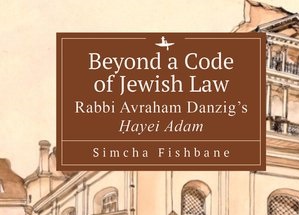April 10, 2022
Published by Jeffrey Saks at April 10, 2022
The distinguished author Cynthia Ozick responds to Sarah Rindner Blum's recent essay "Living Antiquities: Ozick, Great Books & Judaism" (TraditionOnline) -- part of TraditionOnline'e ongoing series exploring the role of the classics in contemporary religious life.
April 7, 2022
Published by Jeffrey Saks at April 7, 2022
TRADITION's Spring 2022 issue has arrived -- making its way to subscribers' snailboxes now.
April 5, 2022
Published by Tradition Online at April 5, 2022
Simcha Fishbane’s new book sets out to understand how Hayei Adam went from being a widely popular halakhic work among laymen, although largely ignored by the rabbinic establishment of its day, to a paradoxical mirror status in our own. Gidon Rothstein reviews…
April 3, 2022
Published by Tradition Online at April 3, 2022
Surveying the mid-twentieth century American Jewish community from his pulpit, R. Norman Lamm mined the Passover story for two purposes – to make the case for royal humility, a constant vacillation between the confidence of freedom and the modesty of servitude, and as a call for a renewed and passionate Jewish observance. Stuart W. Halpern examines these themes as reflected in R. Lamm’s “The Royal Table.”
March 31, 2022
Published by Tradition Online at March 31, 2022
Yitzchak Blau writes on C.S. Lewis’ “An Experiment in Criticism” for The BEST: “Literature does provide pleasure, but it surely does more than that. It opens readers to new horizons, inspires them to analyze ideas, and connects them to a more profound sense of the good. If so, a poem must both be and mean.”
March 29, 2022
Published by Tradition Online at March 29, 2022
In TRADITION’s winter issue we published Barry Kislowicz’s “From Intuition to Evidence” about implementing “faith development” theory in Jewish schooling. Read the author’s exchange with a reader who asks about the role of homes and families in this challenging work.
March 27, 2022
Published by Tradition Online at March 27, 2022
Geula Twersky’s “Torah Song” (Kodesh Press) offers a remarkable analysis of the major poems of the Torah, and is a creative attempt to underline how the entire Torah—and particularly its poetic passages—forms an intricate network of ideas that unite the ideology of the Torah. Hayyim Angel reviews Twersky’s book, suggesting it will prompt readers to exert extra effort to fathom the divine treasures underlying biblical poetry, and to become religiously inspired through these efforts.
March 24, 2022
Published by Jeffrey Saks at March 24, 2022
Chaim Strauchler on “The Idea of the Holy” for “The BEST”: Empiricism says things that cannot be measured do not really exist. Writing at the start of the 20th century, Rudolf Otto cried foul. There’s something within us (and beyond us) that cannot be reduced to external observation. This anti-reductionist approach is a critical weapon in a Ben or Bat-Torah’s arsenal today.
March 23, 2022
Published by Tradition Online at March 23, 2022
The overall aim of Menachem Kellner’s “We Are Not Alone” is to articulate a universalistic interpretation of Orthodoxy which emphasizes the Torah’s explicit teaching that all human beings are created in the image of God. He finds an appreciative reader in Michael Harris who writes: “Rootedness in the particular texts and traditions of Judaism together with compassionate universalism remains an all-too-rare combination in today’s Orthodox world. This book provides strength and support for those convinced that the most noble stance for Orthodoxy is one which reaches out from a non-negotiable matrix of halakhic fidelity and proud particularity to embrace all those created in the image of God.”









